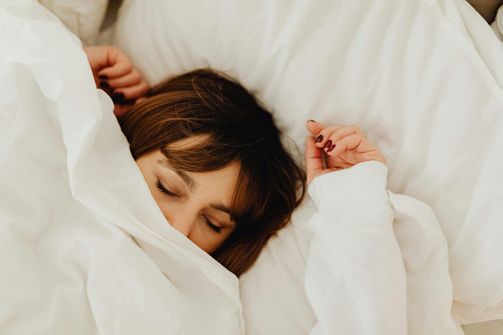
Benefits of Sound Healing and Maximizing Your Sleep Quality
Getting a good night’s sleep is essential for overall well-being, but in today’s world, many of us struggle to relax before bed—especially women manag...

Valerian, known scientifically as Valeriana officinalis, is a hardy perennial plant hailing from Europe and Asia. It’s steeped in a rich history, having been utilized for its medicinal benefits since the ancient civilizations of Greece and Rome, particularly for promoting relaxation and aiding sleep. This guide delves into the specifics of valerian root, exploring its potential health applications and offering advice on how to incorporate this supplements into your regimen safely.
Originating from Europe and Asia before making its way to North America, valerian is characterized by its tall, robust stems, sharply pointed leaves, and flowers that bloom in hues of white or pale pink. However, it’s perhaps most notorious for its potent, somewhat off-putting scent.
The root and stems of the valerian plant are usually processed by drying or extracting to produce teas, tinctures, or capsules, making it easier for supplementation.
Valerian root is believed to exert a sedative effect, possibly by triggering the release of gamma-aminobutyric acid (GABA) in the brain.
GABA plays a crucial role in calming the central nervous system by inhibiting certain neural activities, thus reducing overall nervous system excitability and fostering a sense of tranquility.
Research, including studies conducted on animals, indicates that valerian’s calming effects are facilitated through its interaction with GABA receptors. It’s thought that valerian may not only boost GABA levels but also enhance the nervous system’s response to this neurotransmitter, promoting relaxation. Additionally, valerian contains iridoids, compounds recognized for their neuroprotective and liver-protective benefits, and valued in traditional Chinese medicine for health and wellness.
With its millennia-long history, valerian has been tapped for various health conditions, though not all claims are currently backed by robust scientific evidence. Nonetheless, research supports the notion that valerian root can positively affect sleep patterns and stress management.

Sleep issues are widespread, affecting numerous adults in the United States, with significant implications for overall health. Among natural sleep aids, valerian root stands out as a viable alternative.
Valerian root’s efficacy in improving sleep is well-documented, with its use in Europe as a sleep enhancer spanning many years. Studies, including a notable one focusing on women aged 50-60, have observed improvements in sleep quality with daily intake of valerian extract.
A study from 2017 further demonstrated valerian’s effectiveness in reducing the time to fall asleep and minimizing night-time awakenings, thereby extending total sleep duration. These improvements were also linked to better daytime functioning, with participants reporting enhanced energy levels and concentration.
Besides valerian, establishing a regular nighttime routine is advocated by the CDC as part of good sleep hygiene practices. Such routines might include maintaining a consistent bedtime, minimizing screen exposure before bed, avoiding caffeine in the late afternoon and evening, creating a sleep-conducive environment (dark and cool), and listening to calming music. Exposure to morning sunlight and engaging in daytime physical activities are also beneficial for sleep quality.
Emerging research suggests valerian root could be effective in stress management. An eight-week study observed reductions in both physical and psychological stress among participants taking valerian root extract (VRE). Additionally, a 2019 study employing electroencephalography (EEG) found that VRE influenced functional brain connectivity, which measures the interaction among different brain regions, in subjects consuming 100mg of VRE thrice daily.
While more research is needed, preliminary studies indicate valerian root may offer benefits for managing menopause symptoms, such as reducing the severity and frequency of hot flashes, and alleviating menstrual-related issues, including the emotional, physical, and behavioral symptoms associated with premenstrual syndrome (PMS).
Dosages in research studies typically range from 300mg to 600mg daily. However, the optimal dosage can vary depending on individual health goals and responses, making it essential to consult a healthcare professional for personalized advice.
Valerian supplements are generally taken before bedtime, but adherence to specific product instructions is crucial for achieving the desired outcomes.
Although valerian is recognized as a natural sleep aid, most research has focused on short-term use (up to six weeks), leaving the safety of prolonged consumption unclear.
Valerian root is known for its rapid action in promoting sleep onset, though individual responses can vary. Consistency in use is key to experiencing sustained benefits.
Valerian root is generally well-tolerated, with fewer side effects compared to prescription sleep medications. Nevertheless, individual reactions can differ, and it’s important to be aware of potential side effects such as dizziness, headaches, uneasiness, stomach discomfort, and drowsiness. Opting for third-party tested products can help ensure their safety and quality.
Pregnant or breastfeeding individuals should avoid valerian, and it’s always prudent to consult a healthcare provider before starting any new supplement to prevent adverse effects or interactions with other medications.
For those dealing with persistent sleep issues, seeking medical advice is advisable to rule out underlying health conditions.
Valerian root really brings a natural and time-tested remedy to the table, especially when it comes to boosting sleep quality and tackling stress. It’s got a solid track record, backed by both its long history of use and modern-day studies. And while it shows promise for other health concerns, like easing menopause symptoms and menstrual discomfort, it’s super important to chat with a healthcare pro before jumping into supplementation. They’ll help make sure it’s a safe and effective move for you.
A: Valerian Root comes from the Valeriana officinalis plant. It’s celebrated for its calming effects and is commonly used to improve sleep and reduce stress.
A: It works by increasing gamma-aminobutyric acid (GABA) levels in the brain, which helps to calm the nervous system and makes falling asleep easier.
A: Absolutely. The root’s natural sedative qualities are effective in soothing stress, easing the mind, and promoting a sense of relaxation.
A: Valerian Root can be consumed in various forms, such as teas, capsules, or tinctures. It’s typically recommended to take it shortly before bedtime, but it’s best to consult with a healthcare provider for advice tailored to your needs.
A: Most people tolerate Valerian Root well, but some may experience mild side effects like dizziness, headache, or stomach upset.
A: It’s advisable for pregnant or breastfeeding women, children, and those on certain medications to consult a healthcare professional before using Valerian Root to prevent possible adverse reactions.

Getting a good night’s sleep is essential for overall well-being, but in today’s world, many of us struggle to relax before bed—especially women manag...

Melatonin, a hormone central to regulating our sleep-wake cycle, sees its levels naturally rise in response to darkness, helping signal the body it's ...

Welcome back to our cozy corner of the internet, where we untangle the mysteries of sleep, armed with a flashlight of science and a map of personal st...

Let's chat about something we all know too well – stress. It's like that uninvited guest at your party, especially for us ladies. Our bodies have this...

Improving the way our brain works and how we remember things is something many women try to do, especially when they go through different phases of li...